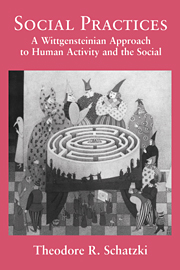Book contents
Postscript: Individual and Totality
Published online by Cambridge University Press: 17 September 2009
Summary
This essay began by describing recent challenges to the two master concepts that, from its inception, have dominated thought about the nature of social life: individual and totality. I presented practice theory as one prominent stream of thought pressing these challenges and explained that its refusal to abandon general theory is one feature differentiating it from some contemporaneous movements critical of the traditional dualism. As we have since seen, two principal phenomena frame its attempt to fashion large-scale accounts of social life. The first is practices, the second understanding/intelligibility. Although practice theories tender divergent conceptions of practice, agreement reigns that practices are the central moment in social life because they are the site where understanding is carried and intelligibility articulated. Social life is an intricate nexus of practice, thus centrally a complicated weave of constellations of normativized understanding and intelligibility articulated through action.
If the picture of social life as a nexus of practice offers a genuine alternative to accounts organized around the notions of individual or totality, it should advance critique of the hegemonic claims traditionally raised for individuals and totalities in the theoretical study of social life. Analyses grounded on it should also underwrite more clairvoyant understandings of both individuals and whatever social wholes do exist. The current book can claim to have fulfilled these desiderata for individuals alone.
- Type
- Chapter
- Information
- Social PracticesA Wittgensteinian Approach to Human Activity and the Social, pp. 210 - 211Publisher: Cambridge University PressPrint publication year: 1996

